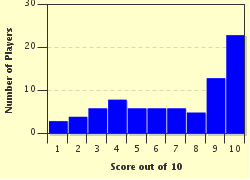Quiz Answer Key and Fun Facts
1. What does the name "Micah" or "Michayahu" mean, in the Hebrew language?
2. The beginning chapters of Micah address judgments that are about to be passed on the lands of Samaria and Judah, as well as the princes and the prophets of the land of Judah. What does Micah say will be the fate of the graven images found in Samaria, in Micah 1:7?
(King James Version)
3. What horrific action are the princes of Judah engaged in, at least in a prophetic or metaphorical way, as described in Micah 3?
(King James Version)
4. Micah 4:3 is almost identical in its wording to another verse in the Old Testament/Tanakh. Which other Bible book contains very similar wording in the King James Version?
"And he shall judge among many people, and rebuke strong nations afar off; and they shall beat their swords into plowshares, and their spears into pruninghooks: nation shall not lift up a sword against nation, neither shall they learn war any more."
5. "But thou, Bethlehem Ephratha, though thou be little among the thousands of Judah, yet out of thee shall he come forth unto me that is to be ruler in Israel: whose goings forth have been from of old, from everlasting."
(Micah 5:2 KJV)
Along with Jerusalem, this location has been called the "city of... WHOM"?
6. In Micah 4:11-13, he speaks of many nations gathered together to do harm to Israel. In the King James Version of the Bible, what does he say will be the final result of the actions of such nations?
7. In Micah 5, a "remnant" or a remaining group of Jacob's descendants (Jews), are to be left alive, but where will they be living, according to Micah 5:7 and 8?
8. In chapter 7 of Micah, as he replies back to the Lord's pleadings with His people, he says that good men perish out of the earth, leaving evil people to do their deeds with "both hands earnestly" (7:3, KJV).
What does he compare the 'best' of these evil men to, in verse 4?
9. What type of lying prophet does Micah talk about in Micah 2:11, in the King James Version?
10. In Micah 7:18, why does he say that God does not retain His anger for ever?
Source: Author
logcrawler
This quiz was reviewed by FunTrivia editor
CellarDoor before going online.
Any errors found in FunTrivia content are routinely corrected through our feedback system.

